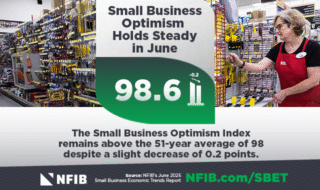Topics:
December 14, 2022
NFIB continues to support small business rights in court
Legal Update: Courts Consider Cases Significant to Small Businesses
Erick Adolph v. Uber Technologies, Inc.
On December 8, NFIB filed an amicus brief in this case at the California Supreme Court. The case centers on California’s Private Attorneys General Act (PAGA) and whether PAGA-plaintiffs can join a group claim in state court after their individual claims proceed to arbitration. The brief argues two main points:- The California Court of Appeals’ decision conflicts with the U.S. Supreme Court’s decision in Viking River Cruises earlier this year, where the court ruled that PAGA claims can be divided into individual claims (which are subject to arbitration), and representative claims (where the plaintiff represents others in court, such as an employee representing all other employees at their organization.) PAGA only allows “aggrieved employees” to make representative claims, and that means a plaintiff claiming that they are an “aggrieved employee” is a claim that is subject to arbitration. In other words, plaintiffs should get one bite at the apple.
- Alternative dispute resolution proceedings such as arbitration are better for employees, employers, and the court system. California should allow for broad arbitration of PAGA claims.
Natural Resources Defense Council v. National Highway Traffic Safety Administration, et al.
On Dec. 1, NFIB filed an amicus brief in this case at the U.S. Court of Appeals for the District of Columbia. The brief argues that the National Highway Traffic Safety Administration’s (NHTSA) fuel-economy standard violates the Energy Policy and Conservation Act by essentially forcing consumers to switch to electric vehicles. “This case highlights another instance where a government agency is acting without clear Congressional approval,” said Milito. “The NHTSA does not have the authority to mandate their fuel-economy standards and we urge the Court to set aside the requirements.”Wilkins v. United States
On Nov. 30, the Supreme Court heard oral arguments for this case, which concerned when a property owner must sue the U.S. government in a property dispute. In this case, the U.S. Forest Service opened a portion of Mr. Wilkins’ private road to the public without telling him they had done so. When he filed suit against the government, they tried to dismiss Wilkins’ claim by arguing that he waited too long to sue. NFIB filed an amicus brief supporting Mr. Wilkins’ claim. “Small business property owners are at an overwhelming disadvantage in property disputes between private landowners and the government,” said Milito. “Private landowners, many of whom are small business owners, do not have the financial resources or manpower to fight back when their private property rights are being disregarded by the government. NFIB hopes the Supreme Court will act in favor of private landowners and small business owners nationwide and reverse the lower court’s decision.”
Get to know NFIB
NFIB is a member-driven organization advocating on behalf of small and independent businesses nationwide.
Related Articles

July 14, 2025
New NFIB Op-Ed: Small Businesses Need Credit Card Swipe Fee Ref…
#post_excerpt
Read More


July 14, 2025
Small Business Optimism Remains Steady but Still Above Average…
The NFIB Small Business Optimism Index declined by 0.2 of a point in June w…
Read More


July 14, 2025
Bill to Stop Shakedown ADA Lawsuits Fails to Advance
Legislature places fat cat lawyers above starving small business owners
Read More


July 14, 2025
Paid Leave and Employer Obligations
Knowing when employee time off is required to be paid or unpaid can be comp…
Read More







